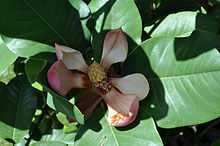Magnolia delavayi
| Chinese Evergreen Magnolia | |
|---|---|
 | |
| Conservation status | |
| Scientific classification | |
| Kingdom: | Plantae |
| (unranked): | Angiosperms |
| (unranked): | Magnoliids |
| Order: | Magnoliales |
| Family: | Magnoliaceae |
| Genus: | Magnolia |
| Subgenus: | M. subg. Magnolia |
| Section: | M. sect. Gwillimia subsect. Gwillimia |
| Species: | M. delavayi |
| Binomial name | |
| Magnolia delavayi Franch. | |
Magnolia delavayi is a species of Magnolia native to southern China, occurring in Guizhou, Sichuan and Yunnan at 1,500-2,800 m altitude. It is known by the common names of Chinese Evergreen Magnolia or Delavay's Magnolia. It was named after Father Delavay, French Catholic missionary in China, who collected it.
Description

Magnolia delavayi is a small evergreen tree 8–15 metres (26–49 ft) in height with pale to dark yellowish-brown bark. The leaves are oblong-ovate, 10-20 cm (rarely to 32 cm) long and 5-10 cm (rarely to 20 cm) broad, tough, leathery, with a 5-7 cm petiole.
The flowers are fragrant, cup-shaped, 15-25 cm broad, with nine thick, creamy white to pink tepals; they appear from July to August.
Cultivation
Magnolia delavayi is grown as an ornamental tree for its evergreen foliage as well as flowers. It is uncommon though increasing in cultivation elsewhere, such as in California. A recently selected red-flowered form is becoming popular in cultivation.
Magnolia delavayi is the city tree of Chongqing.
References and external links
Further reading
- Hunt, D. (ed). (1998). Magnolias and their allies. International Dendrology Society and Magnolia Society. ISBN 0-9517234-8-0
| Wikimedia Commons has media related to Magnolia delavayi. |
